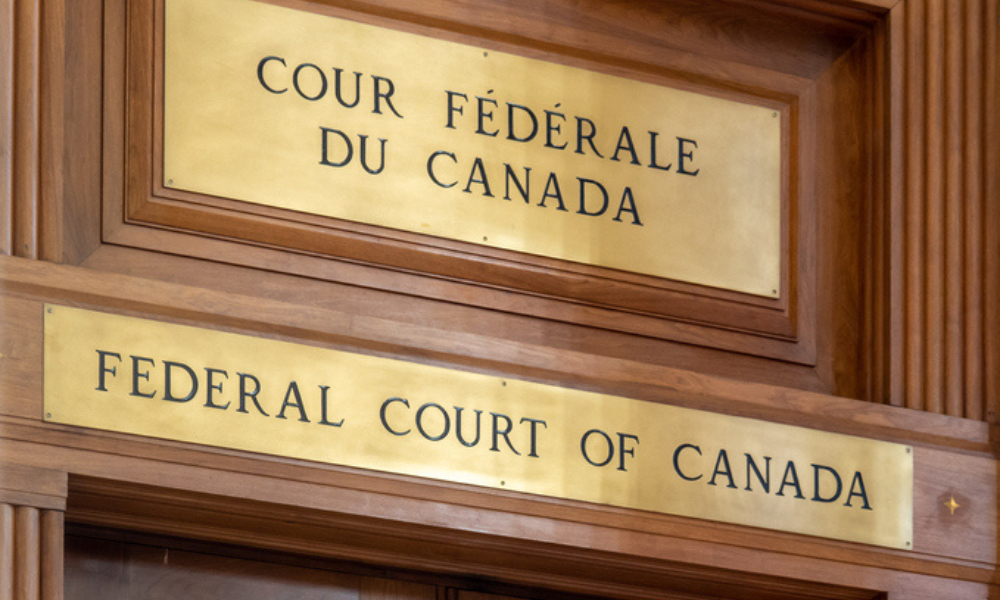
Federal Court tackles matters involving Canada Recovery Benefit eligibility this week

The Federal Court’s schedule this week includes lawsuits brought by individuals seeking to run in elections for the leadership of the Salt River First Nation (SRFN) and applicants alleging that they are eligible for the Canada Recovery Benefit (CRB).
On Thursday, the court will hear Kathleen O'Grady v. Bell Canada, A-126-20. The appellant’s judicial review application challenged a decision of the Canadian Human Rights Tribunal. Bell Canada allegedly subjected the appellant to mental illness disability discrimination and unethically and wrongfully terminated them.
The appellant claimed that Bell should treat employees with good faith and fair dealing at the time of termination and failed its duty of due diligence and its duty to accommodate by reneging on its long-term disability benefits rehabilitation program.
On Monday, the court heard Attorney General of Canada v. Animal Justice Canada and Soi Dog Canada, T-1245-23. The federal attorney general asked for an order under s. 37(6) of the Canada Evidence Act, 1985 prohibiting the disclosure of certain information.
The attorney general argued that the redacted information, if publicly disclosed, could harm the public interests in the Canadian Food Inspection Agency’s relationships with partner foreign government entities and with provincial and territorial governments and the public interests in information sharing between the agency and partner foreign government entities and between the agency and provincial and territorial governments,
Also on Monday, the court heard Councilor Spence Coutlee v. Lower Nicola Indian Band, Chief Stuart Jackson, T-1330-20. A judicial review application alleged that a decision by the Lower Nicola Indian Band Chief and Council adopted the minutes of an unlawfully convened meeting.
The applicant claimed that the decision was invalid, unlawful, and against the band’s election rules. The band’s chief and council allegedly failed to observe its own laws and policies and failed to be reasonable when making its decision.
The court’s schedule this week includes numerous decisions concerning the SRFN. On Wednesday, the court heard Jeannie Marie-Jewell v. Salt River First Nation #195, T-1562-22. A judicial review application challenged a decision of the council of the Salt River First Nation #195 denying the applicant an opportunity to run in a Sept. 16, 2022 election.
The applicant argued that the decision was unreasonable, was lacking in procedural fairness, and was based on an alleged 2014 debt owed to the SRFN, which the applicant denied. Even if the debt was true, the SRFN was allegedly guilty of laches and was statute-barred from enforcing the debt.
On Friday, the court will hear the cases of Robert Houle et al v. Swan River First Nation et al, T-903-19 and Shawna Jean v. Swan River First Nation et al, T-904-19. A SRFN electoral officer refused the nominations of the plaintiffs for council positions because they were not residing on the reserve for the past year.
The plaintiffs’ judicial review application alleged that the residency requirement in the SRFN Election Code breached s. 15 of the Canadian Charter of Rights and Freedoms. They requested an interlocutory injunction to halt the election set for June 14, 2019 until the determination of their underlying application.
In June 2019, the Federal Court released the decision of Houle v. Swan River First Nation, 2019 FC 803, alongside the ruling in Jean v. Swan River First Nation, 2019 FC 804. The court denied the interlocutory injunction motion. While the plaintiffs raised a serious issue, they failed to establish irreparable harm and failed to meet the three-part test for getting an interlocutory injunction, the court said.
The court dealt with multiple matters involving CRB eligibility this week. On Tuesday, the court heard Farah Sabena Khan v. Canada Revenue Agency, T-393-22. The applicant challenged the Canada Revenue Agency’s finding that they were ineligible for the 12-month period preceding their application because they did not earn at least $5000 of taxable self-employment income in 2019–2020.
On Wednesday, the court heard Blair Merluk v. Attorney General of Canada, T-1636-22. The applicant alleged that the review officer’s decision was unreasonable. The applicant claimed to meet the income requirements for receiving benefits because their 2019 taxable income was over $5000.